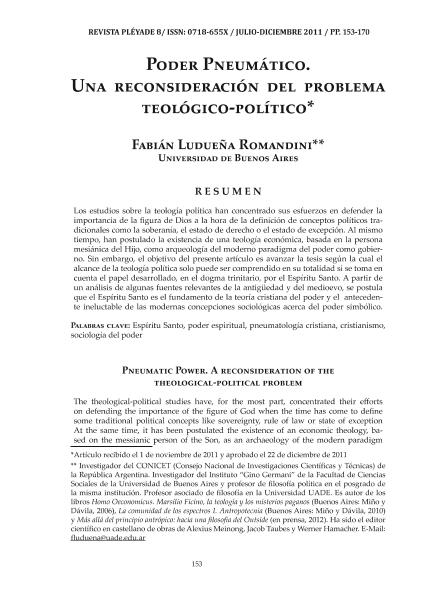Mostrar el registro sencillo del ítem
dc.contributor.author
Ludueña, Fabian Javier

dc.date.available
2023-04-17T13:02:57Z
dc.date.issued
2011-12
dc.identifier.citation
Ludueña, Fabian Javier; Poder Pneumático: Una reconsideración del problema teológico-político; Centro de Análisis e Investigación Política; Pléyade; 8; 12-2011; 153-170
dc.identifier.issn
0718-655X
dc.identifier.uri
http://hdl.handle.net/11336/194092
dc.description.abstract
Los estudios sobre la teología política han concentrado sus esfuerzos en defender la importancia de la figura de Dios a la hora de la definición de conceptos políticos tradicionales como la soberanía, el estado de derecho o el estado de excepción (Carl Schmitt). Al mismo tiempo, han postulado la existencia de una teología económica, basada en la persona mesiánica del Hijo, como arqueología del moderno paradigma del poder como gobierno (Giorgio Agamben). Sin embargo, el objetivo del presente artículo es avanzar la tesis según la cual el alcance de la teología política solo puede ser comprendido en su totalidad si se toma en cuenta el papel desarrollado, en el dogma trinitario, por el Espíritu Santo. A partir de un análisis de algunas fuentes relevantes de la antigüedad y del medioevo, se postula que el Espíritu Santo es el fundamento de la teoría cristiana del poder y uno de los antecedentes teóricos importantes que han inspirado a algunas de las modernas concepciones sociológicas acerca del poder simbólico.
dc.description.abstract
The theological-political studies have, for the most part, concentrated their efforts on defending the importance of the figure of God when the time has come to define some traditional political concepts like sovereignty, rule of law or state of exception At the same time, it has been postulated the existence of an economic theology, based on the messianic person of the Son, as an archaeology of the modern paradigm of power as government. However, the goal of this article is to set forth the thesis according to which the scope of the political theology can only be fully understood if the role of the Holy Spirit within the Trinitarian Dogma, is taken into account. Starting from an analysis of some relevant ancient and medieval sources, the Holy Spirit is postulated as the key element in the Christian theory of power and as an ineluctable antecedent of modern sociological conceptions about symbolic power.
dc.format
application/pdf
dc.language.iso
spa
dc.publisher
Centro de Análisis e Investigación Política
dc.rights
info:eu-repo/semantics/openAccess
dc.rights.uri
https://creativecommons.org/licenses/by-nc/2.5/ar/
dc.subject
Poder Espiritual
dc.subject
Pneumatología cristiana
dc.subject
Sociología del poder
dc.subject
Teología política
dc.subject.classification
Otras Ciencia Política

dc.subject.classification
Ciencia Política

dc.subject.classification
CIENCIAS SOCIALES

dc.title
Poder Pneumático: Una reconsideración del problema teológico-político
dc.title
Pneumatic Power: A reconsideration of the theological-political problem
dc.type
info:eu-repo/semantics/article
dc.type
info:ar-repo/semantics/artículo
dc.type
info:eu-repo/semantics/publishedVersion
dc.date.updated
2023-04-14T15:52:59Z
dc.identifier.eissn
0719-3696
dc.journal.number
8
dc.journal.pagination
153-170
dc.journal.pais
Chile

dc.journal.ciudad
Santiago de Chile
dc.description.fil
Fil: Ludueña, Fabian Javier. Consejo Nacional de Investigaciones Científicas y Técnicas; Argentina. Universidad Argentina de la Empresa; Argentina. Universidad de Buenos Aires. Facultad de Ciencias Sociales. Instituto de Investigaciones "Gino Germani"; Argentina
dc.journal.title
Pléyade
dc.relation.alternativeid
info:eu-repo/semantics/altIdentifier/url/https://www.revistapleyade.cl/index.php/OJS/article/view/230
dc.relation.alternativeid
info:eu-repo/semantics/altIdentifier/url/https://dialnet.unirioja.es/servlet/articulo?codigo=3978756
Archivos asociados
